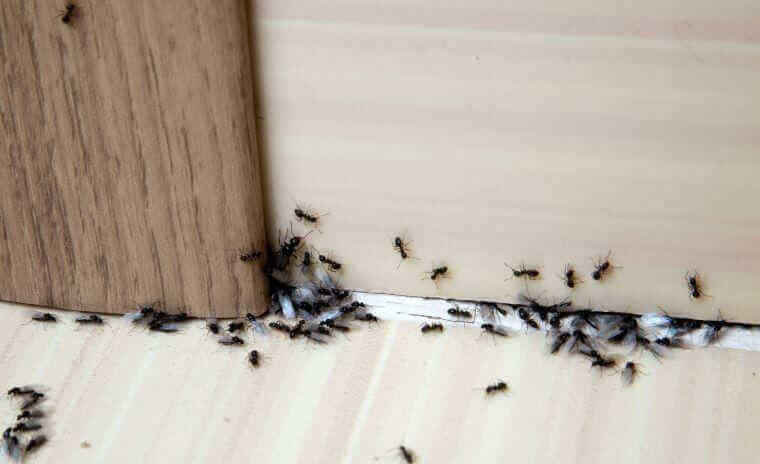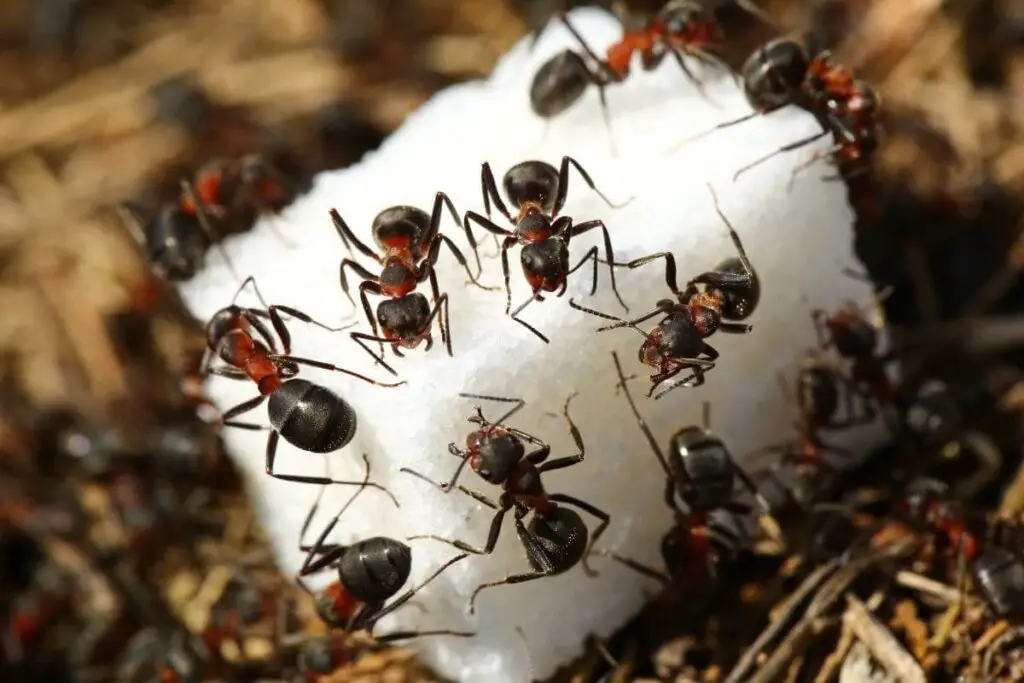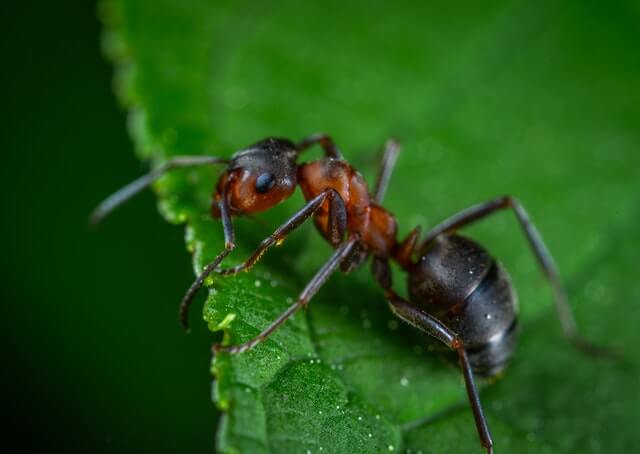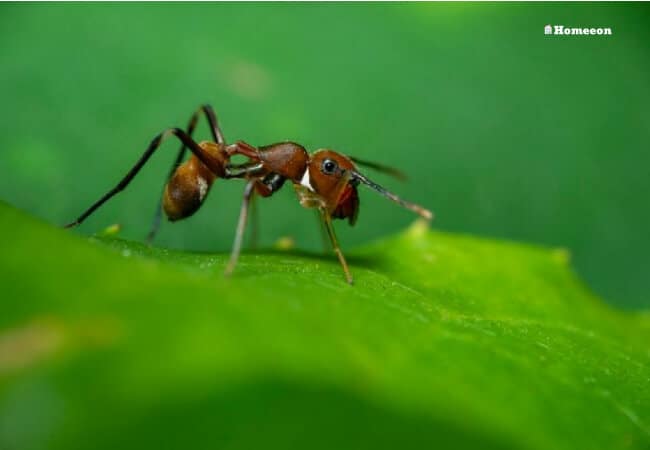Last Updated on August 16, 2023 By Emma W. Thomas
Ants are attracted to food crumbs, sweet substances, and moisture. To get rid of them, keep surfaces clean, seal food tightly, fix leaks, and use natural repellents like vinegar or essential oils. Borax or diatomaceous earth can deter them too. Persistent cleanliness helps prevent ant infestations effectively.
What attracts ants to your house?

Ants get into our houses looking for food, water, and shelter. The smell of food or moisture especially draws them, and when they find them in our houses, they keep coming in large numbers and build nests inside our homes.
- Improperly stored food
Just like any living creature, ants need to eat for survival, and they work hard to find food enough for them to eat and store. When you leave food or crumbs on surfaces, ants take advantage and invade your home. Spillages of sweet and sugary food such as honey, jelly, and juices also attract ants, and that is why you need to keep your house clean. Always ensure you wipe down surfaces after meal prep and clean appliances and thin spaces that might contain crumbs often. It is also important to store food in airtight containers or sealed bags to keep ants away. By reducing their access to food, you will greatly reduce the chances of an ant infestation.
- Water and moisture
Ants are attracted to damp and wet surfaces, especially in the summer and winter, since it is harder to find water outside. If you ever wondered why ants mostly invade your bathroom and kitchen, then you have the answer now. To prevent an ant infestation, always ensure you keep surfaces dry. Mop any spillages and avoid leaving dry towels or rugs lying around in the house. Ensure you repair any leakages as soon as you notice them. Carpenter ants are fond of damp wood, which is often caused by leakage.
- Comfortable and hospitable indoors
During extreme weather conditions such as excessive heat, freezing outdoors, and too much rain, ants seek refuge in warm and cozy places. If they find an easy access point to your house, they will come in and build their nests there. The surest way of preventing ants from coming into your home is to destroy anthills and nests around your house as soon as you notice them and seal any cracks that ants might use to get in.
How to get rid of ants and prevent further infestation
Now that you know what might be attracting ants to your home, let’s help you to eliminate them. Here are some tips on how to get rid of ants:
- Identify trails used by the ants from their nest to your house
- Use baits indoors instead of pesticides
- Carefully use pesticides outside
- Keep the house clean
- Seal any potential entry points
- If the problem persists or there’s a carpenter ants infestation, hire an exterminator
- Identify trails used by the ants from their nest to your house
The most visible ants around our homes are worker ants that have been tasked with finding food and carrying it back to their nest. When they find food, they leave a chemical trait that other ants will follow to bring more food. Identifying this path is a good step in the right direction since you can now set up poisonous bait for the ants to carry back to the nest. When you identify the trail, you can choose to wipe it down. But have in mind that you will not have completely gotten rid of the ants since the queen is normally left in the nest and will produce other worker ants and send them out.
- Use baits indoors instead of pesticide

Avoid using pesticides to eliminate the ants that are seen marching in your home. You need to get a solution that goes all the way to the hidden nest and eliminates the whole colony. Ant baits are an effective way of eliminating the whole ant colony. Ant baits can be made by mixing sweet and sugary foods with boric acid. Boric acid is a natural substance that is toxic to ants and entirely safe for humans. Ant baits should be placed close to an ant trail but away from children or pets. When the worker ants carry the bait to the nest, the ants eat it and die. For the bait to work, make sure all other surfaces are clean and free from food particles. This helps to ensure that the bait is the only substance the ant will eat. After using bait, you need to be patient since it takes some time before all the ants eat the bait and get eliminated.
- Carefully use pesticides outside
If you follow an ant trail and discover that their nest is outside the house, you can use liquid pesticides to drain the nest and reach the queen. When using a pesticide, always make sure you follow all the label instructions. Most pesticides are harmful to all insects, including those that are beneficial to us, so apply carefully.
- Keep the house clean
Hygiene is crucial in the prevention of any pest invasion. Ensure you keep surfaces clean and free from crumbs, especially when using an ant bait. When cleaning, do not clean off the ant trails before the colony is eliminated. When you are sure that the ants have eaten the bait and are all dead, you can go ahead and clean away the trails. Always ensure you clean any spillages as soon as they happen.
- Seal any potential entry points
Ants are very tiny and can access your homes through crevices and cracks. To minimize ant infestation, always check the foundation of your house for any cracks that might allow ants to get in and seal them. You should also inspect doors, windows, and cable entry points regularly and ensure they are completely sealed.
- If the problem persists or there’s a carpenter ants infestation, hire an exterminator

If an infestation gets out of control, you may need professional expertise. Exterminators will effectively get rid of ants by treating your entire home for ants. If you have a carpenter’s ant infestation, you might need to hire a professional sooner. These are large ants that are either black or red and eat wood. If not eliminated immediately, they might cause much damage to your home.
Now that you know what attracts ants and how to get rid of them and prevent them from invading your house again, let’s look at some fun facts about ants:
- An ant has the ability to lift 20 times its weight
- Ants unite to form supercolonies, with the largest known ant supercolony being in Japan on the coast of Hokkaidō. This colony contained approximately 306 million worker ants and one million queen ants, which were living in 45,000 nests. These nests were interconnected by underground passages and covered an area of 2.7 km2 (670 acres)
- Queen ants of particular species can live for up to 30 years depending on the hard work of other ants in the colony
- There are more than 10,000 known ant species around the world
- Amazonian ants are asexual and reproduce by cloning thus producing a colony with no male ants
- Ants protect aphids from predators and shelter them in their nests to get a constant supply of honeydew
- Ants have two stomachs, one for themselves and the other for carrying food for those left in the nest
- Ants are as old as dinosaurs
- Fear of ants is known as Myrmecophobia
Are ants harmful to people?
Though often viewed as pesky intruders in our households, most ant species pose little to no threat to humans. However, there exist specific circumstances and types of ants that might manifest harmful behaviors. Below are some ways ants can be harmful to people.
1. Bites and Stings
Certain species of ants, like fire ants and bullet ants, can inflict painful bites or stings. The venom these ants release in their victims can cause discomfort, swellings, rashes, and, in severe cases, allergic reactions.
2. Allergic Reactions
A small percentage of people may experience severe allergic responses to ant bites or stings. Symptoms range from minor swellings and itchiness to anaphylaxis – a life-threatening reaction that needs immediate medical intervention.
3. Potential Disease Carriers
Ants often traverse through unhygienic areas while foraging for food. As a result, they have the potential to carry and spread diseases, bacteria, and fungi onto food and surfaces within human dwellings.
4. Structural Damages
Carpenter ants can burrow into wooden structures, potentially causing significant structural damage over time if left unchecked. While this does not pose a direct health risk to humans, the financial implications can be substantial.
5. Psychological Stress
While not directly physically harmful, having an infestation in your home can cause psychological stress due to fear and discomfort.
To summarize, while ants are a crucial component of global ecosystems aiding in essential duties like decomposition and turning soil, certain interactions between them and humans can prove harmful. Knowledge about these potential threats is key for safe handling and coexistence with these abundant creatures.
How to Prevent Ants from Coming Inside Your Home
1. Keep Your Home Clean
Ants are attracted to food residue, especially sweet and sticky substances. Ensuring a clean house, particularly in areas like the kitchen and dining room, can significantly reduce the chances of calling out to these pests. Regularly cleaning crumbs off countertops, sweeping floors, and making sure that food is sealed properly can prove to be extremely effective.
2. Seal Possible Entry Points
Ants are incredibly small creatures that can easily find their way through minute cracks and crevices. One essential step in preventing an invasion is to seal any potential entry points. This includes windowsills, doors, or any small holes in the walls. Using a caulking gun to fill in these crevices can effectively keep ants out.
3. Use Natural Repellents
Certain natural substances can deter ants away. These include vinegar, cinnamon, peppermint oil, and coffee grounds. By deploying these natural repellents around places where you have noticed ants’ presence, you can establish a barrier they’re likely to avoid.
4. Keep Your Yard Pruned
Overgrown vegetation or piles of wood in your yard can serve as a shelter for ants’ colonies. Regular yard maintenance, such as pruning trees and shrubs away from your house and keeping your lawn debris-free, can reduce the possibility of inviting ants into your home.
5. Use Ant Baits
If ants are already present in your home, using ant baits can be an efficient way to eliminate them. Ant baits contain pesticides mixed with substances that attract ants. The ants carry these lethal treats back to their colony, poisoning it in the process.
6. Regular Pest Control Services
Investing in regular pest control services is a valuable preventative measure. Professionals are trained to identify potential signs of an infestation early on. They also have access to more potent treatments than those available over the counter.
In conclusion, keeping ants from invading your home involves both preventative measures, like keeping a clean house and yard, as well as reactive measures such as using ant baits or hiring professionals.
Conclusion
Ants are fun insects to study and learn about, but they can be very annoying when they invade your house. For you to keep away ants, make a habit of cleaning spills from surfaces, keep floors free from crumbs, clean pet feeding bowls after each feed, and seal and store food properly. You can also ant-proof your home by sealing any cracks on doors, windows, air pipes, or any other exterior openings.
In case of an ant infestation, we advise against trying home remedies as ants might cause much damage while you are still trying to figure out the best solution. Always consult pest control professionals or exterminators to do the work for you. Ensure you deal with the ants from the nest to those you see running around your house. After the successful eradication of ants, keep your house clean all the time and seal all the entryways to prevent future infestation.
References:
https://www.healthline.com/health/how-to-kill-ants
https://www.planetnatural.com/pest-problem-solver/lawn-pests/ant-control/
Emma is a graduate of Domestic Science or Family and Consumer Sciences (Home Economics) from the University of Wisconsin. She has 7 years of experience Working with the strategic section of BestBuy and now writing full-time for Homeeon.
From Managing the Home, Interiors, Cleaning, and Exteriors to Gardening and everything about Making A Home Liveable – is her passion and this Homeeon is the result of this.
Emma loves decorating her home with the best stuff found online. She cares about quality over anything and writes reviews about them here in Homeeon. Get in touch with her over Pinterest.
Keep reading her blogs.

